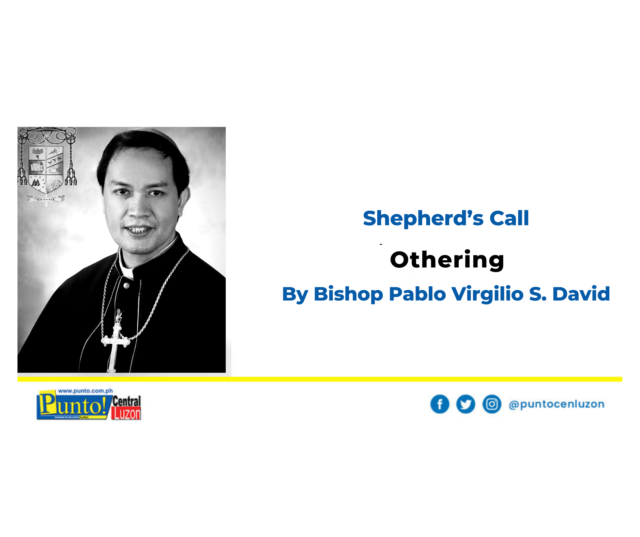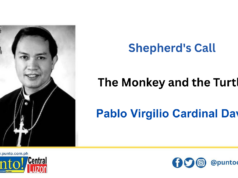AS PART of our preparation for the fiesta of our Cathedral Parish of San Roque, yesterday afternoon, I gave a recollection about the life and mission of San Roque. There was a part in the story that I could not make much sense about until I read about LSI’s in Manila.
LSI is an abbreviation for locally stranded individuals who are trying to get back to their own provinces. They had been locked down in Metro Manila, perhaps because they came here to visit a relative, hoping at the same time to find a job or at least find new opportunities in the big city. Unfortunately, they have been caught unawares by the pandemic.
They have run out of money and even the relatives they thought they could rely on could no longer accommodate them. They could not avail themselves of any “ayuda” or assistance from the barangay or the LGU because they are not in their list of beneficiaries. In short, they are what you might call “local migrants”. And so they found their way to a sports complex where they are herded together to be profiled, and they patiently wait, hoping to be able to get some government assistance, avail themselves of free food, a space to lay their mats on inside the roofed coliseum, and free transportation for their return to their provinces.
San Roque
Why did all this get me to understand the plight of San Roque? Well, during those time before the nation states existed, San Roque was, for all practical purposes, an LSI. He was a native of Montpelier and was on a pilgrimage to Rome when he got himself locked down in the cities along the way that had been struck by a pandemic called the bubonic plague. If our covid comes from bats, the bubonic comes from rats.
Since he was young and healthy – take note he was only in his early 20s – he went out of his way to serve as a health care volunteer to serve the infected ones who were being attended to in a quarantine facility. And like our modernday frontline health workers, he eventually got infected himself. When he was still healthy, he was welcomed to do volunteer work even if he was a stranger. But when he got infected himself, he was no longer welcome. Why? The quarantine facility was only for the local citizens. In short, he was not in the list of beneficiaries.
Our Gospel today is about that general tendency in society towards a strict definition of insiders and outsiders, members and non-members, beneficiaries and non-beneficiaries—whether on the basis of religion, political affiliation, citizenship, or just the color of one’s skin.
Why were the disciples asking Jesus to send the Canaanite woman away? Because she was not in their list of prospective beneficiaries of Jesus’ services. As far as they were concerned, Jesus was already being kind by expanding his list of beneficiaries to include the so-called “lost sheep of the house of Israel”.
Even within the Jewish society, they had a very well–defined system of exclusion.
Culture of exclusion
Right among their own fellow Israelites, there were classes of people who were ostracized. And being a compassionate shepherd who attended not just to the 99 within the fold, but also to the stray, Jesus went against the culture of exclusion. He referred to the excluded ones as the “lost sheep” of the house of Israel.
But take note, the woman in today’s Gospel did not even belong to Israel. She was a pagan, a non-Jew, a non-member of the Chosen people. That is why she did not even seem to take offense at being treated like a dog. Remember how Jesus said, “It is not right to get food from the master’s table and throw it to the dogs.” He was simply trying to explain to her that he had to attend first to the members of the family before giving away some left-overs to the dogs. She did not mind being called a dog, as long as she could avail herself of some crumbs of charity after all the listed beneficiaries were already served.
The humility of her disposition had so struck Jesus, he was moved to say, “Woman how great is your faith.” Like I’ve said in a previous homily on the same Gospel reading, I found myself wondering what faith Jesus was talking about if this woman was not Jewish, meaning, not their fellow believer in Yahweh, the God of Israel. I think what struck him was her love, her readiness to suffer humiliation if only to save herdaughter.
In Pinoy language, we have a reference to a category of dogs and cats that do not belong to the family: ASKALS and PUSAKALS, meaning, asong-kalye and pusang-kalye. Stray dogs and cats. In my younger years, I remember the word PUSAKAL being used in reference to street dwellers and the regular law-offenders who committed petty crimes.
The modern term for their exclusion is OTHERING. It is the same tendency at work when specific sectors of society are vilified and labeled as “drug addicts, drug suspects, criminals, communists, subversives, terrorists, foreigners,” etc. This was Hitler’s effective populist strategy in isolating the Jews from the German society. It’s how he succeeded in keeping people quiet even if they were aware that he was already exterminating them in gas chambers. Remember the famous lines by the German Lutheran pastor, Martin Niemöller, who said:
First, they came for the Jews, but I did nothing because I’m not a Jew.
Then they came for the socialists, but I did nothing because I’m not a socialist. Then they came for the Catholics, but I did nothing because I’m not a Catholic.
Finally, they came for me, but by then there was no one left to help me.
Back to the image of the dogs, I realize now that there is still a much lower category than the usual house dogs and cats: the stray dogs and cats, or the “askals” and “pusakals.”
Dog’s role
What makes the story of San Roque particularly interesting is—the role of the dog that we often see in his icons. The story goes that when he got infected and was refused admission in a quarantine facility, he withdrew to a forest and isolated himself in an abandoned hut in that forest, and nobody welcomed him, except that stray dog that became his friend. You see, unlike human beings, the dogs don’t perceive religious, ethnic, or political differences. For a dog, you are either a threatening or a friendly presence, depending on how you come across to them.
What restores our faith in humanity in the story is that the dog turns out to be a house dog, after all, and that it belonged to a farmer who tilled the farm next to the forest. It is this farmer who eventually discovers that his dog had befriended a stranger: our San Roque. And instead of driving him away, he welcomes him and cares for him until he recovers. I’d say that farmer must have evangelized his dog pretty well by instilling in it the Christian virtue of welcoming a stranger. Remember Matthew 25, where we are told, the Lord will say to the just, “I was a stranger and you welcomed me?”
Try communicating with somebody’s baby even if you are a stranger, and if you come across as a friendly face, the child will start smiling at you and play peek-a-boo with you. But as the child grows, he is going to be told repeatedly, “Don’t talk to strangers.” This is how we start reinforcing the culture of othering.
Our readings today are challenging that tendency towards OTHERING. The prophet Isaiah declares, “My house shall be called a house of prayer for all the nations.”
In the patriarchal stories of the book of Genesis, you will see immediately that the act of welcoming strangers is considered a virtue. They say that in the ancient nomadic culture when the survival of a traveler could depend on the assistance that he could get from people he met on the way, welcoming a stranger was considered a virtue because you’d never know you might be welcoming an angel in disguise, who will reward you for your good deed. Of course, the practical side of you will remain cautious: what if he is a criminal or a fugitive from the law?
The most revolutionary thing about Christianity in the context of Judaism was precisely its impulse to break down the barriers of division that made people treat each other as strangers rather than regard each other as fellow travelers, fellow sufferers, fellow sojourners in this passing world. St Paul declares in Galatians 3:28, “There is neither Jew nor Greek, there is neither slave nor free person, there is not male and female; for you are all one in Christ Jesus.”
(Homily for the 20th Sunday in Ordinary Time, 16 August 2020, Matthew 15:21-28}





